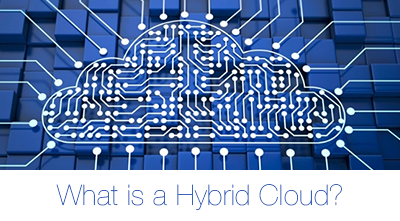What is a Hybrid Cloud?
A hybrid cloud is a combined service of cloud utilizing both public and private clouds to perform distinct functions within the same organization.

A hybrid cloud is a combination of the public cloud and a private cloud. It delivers better security than what is available through the public cloud, and offers excellent scalability, as well as cloud bursting capabilities, but it is not as financially expensive as a private cloud. A hybrid cloud can be a good choice for businesses and organizations that need the protection offered by a private cloud, but do not want to incur the full costs of such a system.
Why Does a Hybrid Cloud Matter?
With the public cloud, your organization can gain cost benefits, can pay as you go, and enjoy significant scalability. However, the security isn’t necessarily all that great. With a private cloud, you have much better security, but the costs are much higher. A hybrid cloud bridges the gap between the other two options.
With a hybrid cloud, you are able to scale up or down as necessary, moving from your private cloud to the public cloud as needs, access, and affordability dictate. This delivers significant flexibility, and also offers many more deployment options for your data. It can also be configured to suit a much wider range of needs.
For instance, suppose your organization ran apps that contained or gave access to sensitive data that had to be protected. This might be consumer financial information, patient medical records, or even proprietary business secrets. However, your organization also uses quite a few consumer facing applications. With a hybrid cloud, you could use a private cloud to host the applications that were the most sensitive, but the public cloud to host those resources that weren’t quite so sensitive.
A hybrid cloud setup would be most valuable in organizations where workload and requirements changed frequently. This arrangement would allow those organizations to scale as needed, while ensuring that protection was provided for the most sensitive resources, but access was easy for non-sensitive resources.
Hybrid cloud technology is also an important consideration when it comes to big data. Sensitive data, such as sales, could be stored securely, but analysis could be run in the public cloud to reduce the demand on resources within the organization.
Problems and Hurdles with Hybrid Cloud Setups
While a hybrid cloud system can be very beneficial for many different organizations and businesses, there are some unique challenges here. Because the hybrid cloud system must interact and operate with third party providers to access the public cloud, there are several important issues to consider. Other topics include API compatibility, as well as network connectivity, SLA breaches and service disruptions to name only a few.
A hybrid cloud setup can provide quite a few advantages, bringing the worlds of public and private clouds together while achieving both better security than public and better affordability than private. However, it’s not a simple thing to achieve and will require significant planning, as well as an experienced hand during setup and maintenance to ensure operability and connectivity.